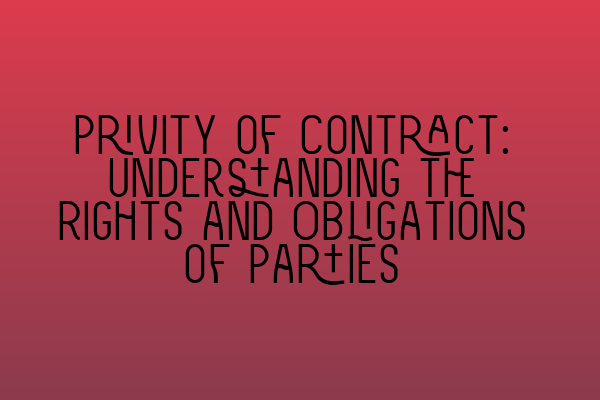Privity of Contract: Understanding the Rights and Obligations of Parties
In the world of contract law, the concept of privity is crucial in determining the rights and obligations of the parties involved. Privity refers to the relationship that exists between parties to a contract, which allows them to enforce the terms and conditions of the agreement. Today, we will dive deeper into the intricacies of privity of contract and shed light on its significance in legal disputes.
What is Privity of Contract?
Privity of contract is a legal doctrine that states that only the parties to a contract have the right to enforce its terms and conditions. This means that individuals or entities who are not part of the contract cannot sue or be sued based on its provisions. The doctrine of privity establishes a direct relationship and connection between the parties and ensures that they are bound by the contract’s obligations and entitled to its benefits.
To illustrate this concept, let’s consider a simple scenario. A and B enter into a contract where A agrees to sell a car to B for a specified price. In this case, both A and B are the parties to the contract, and they have privity of contract. Consequently, if either A or B fails to fulfill their obligations under the agreement, the other party can take legal action against them to seek remedies such as damages or specific performance.
Exceptions to the Doctrine of Privity
While privity of contract is a fundamental principle, there are certain exceptions where third parties can enforce a contract or be sued under it. These exceptions have been developed through common law and legislation to address specific situations where the strict application of privity would lead to unjust outcomes. Let’s explore a few common exceptions to the doctrine of privity:
- Assignment: Assignees, who acquire the rights and obligations of one of the parties to the contract through a valid assignment, can enforce the contract against the other party. For example, if A assigns their rights to C, C can now sue B for any breaches of the contract.
- Agency: In cases where one party acts as an agent of another, the principal can enforce the contract even though they are not a direct party to it. This principle applies when an agent acts on behalf of the principal within the scope of their authority.
- Collateral Contracts: A collateral contract is a separate agreement that is made between one of the parties to the main contract and a third party. If the collateral contract is valid and supported by consideration, the third party can sue or be sued based on its provisions.
- Statutory Exceptions: In certain situations, legislation provides for third-party rights in contracts, allowing individuals or entities who are not parties to the contract to enforce its terms. An example of this is the Contracts (Rights of Third Parties) Act 1999 in the United Kingdom.
The Importance of Privity of Contract
Understanding privity of contract is essential for both solicitors and individuals entering into contractual agreements. As a solicitor, knowledge of privity allows you to advise and guide your clients on the rights and obligations they can enforce or be subject to under a specific contract. It is crucial to analyze and identify privity issues at the outset to prevent future complications and legal disputes.
For individuals and businesses, understanding privity helps protect your rights and interests in contractual relationships. By knowing who can enforce the terms of an agreement and who is bound by its obligations, you can make informed decisions and ensure you are adequately protected. Moreover, awareness of the exceptions to privity can be beneficial in certain contexts, such as when assigning rights or entering into collateral contracts.
Conclusion
Privity of contract plays a vital role in defining the rights and obligations of parties to a contractual agreement. While it generally restricts enforcement to the parties themselves, there are exceptions that allow for third-party rights in certain circumstances. As a solicitor, understanding the intricacies of privity enables you to navigate contracts effectively and provide valuable guidance to your clients.
If you want to learn more about various legal topics, such as mentorship for aspiring solicitors, navigating legal challenges, or exploring alternative dispute resolution, make sure to check out our related articles:
Mentorship for Aspiring Solicitors: Nurturing Talent in the Legal Field,
Legal Challenges and Pitfalls: Navigating the Complexities of the Legal System,
Demystifying the Solicitors Qualifying Examination (SQE): What You Need to Know,
Mentorship for Aspiring Solicitors: Finding Guidance on Your Legal Journey, and
Exploring Alternative Dispute Resolution: An Effective Approach to Legal Conflicts.
